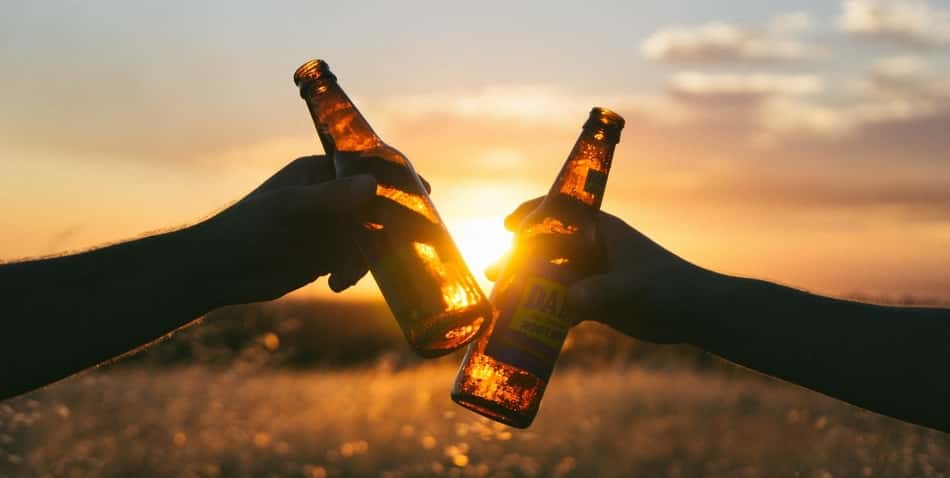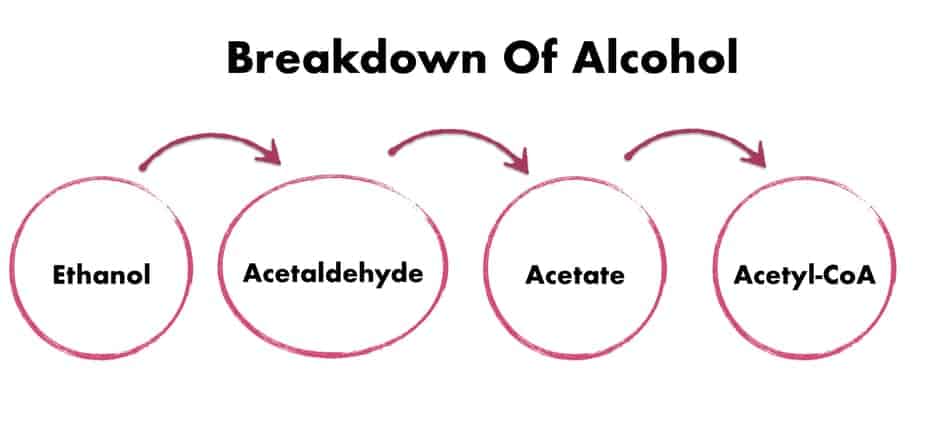When you’re dieting or planning to build on muscle mass, you may be wondering how does alcohol affects your metabolism.
Do you burn more calories when drunk?
As a general rule, you do burn more calories when drunk. Drinking alcohol increases your resting metabolic rate by increasing ethanol-induced thermogenesis (EIT). When drunk, the body significantly increases oxygen consumption which leads to greater calorie expenditure.
Which means you burn more calories when you drunk. But does it mean drinking more will make you lose weight?

Can You Lose Weight From Drinking Alcohol?
As a whole, you can lose weight from drinking alcohol. Alcohol consumption increase resting metabolic rate and make you burn extra calories. However, it is not recommended to rely on alcohol because it enhances energy intake and increases appetite.
On the surface, it really sounds like a good idea.
Alcohol burn more calories. Sign me up!
But.
When we dig a little bit deeper into the research, it’s not all sunshine and rainbows.
- Alcohol increase metabolism
Drinking alcohol increases something which is called ethanol-induced thermogenesis (EIT). This means your body will start to use more energy to convert alcohol into a usable form of energy.
For each gram of alcohol, you get around 7.1 calories. But it’s not available immediately.
So your body needs to manage several processed to actually extract those calories from the alcohol. Just like an m&m’s chocolate. You cannot get to the chocolate center without cracking the shell.
FUN FACT: Your ethanol-induced thermogenesis is around 20% of the ethanol energy ingested.
This means that if you drink 1 shot of vodka (100 calories), 20% of that will be burned by metabolism.
So 20% of calories from the amount that you drink isn’t really that big of a deal.
Nothing to write home about.
- Alcohol enhances appetite
There are significant differences in energy intake following a high dose of alcohol. On average, people tend to eat more after drinking, which contributes to a positive energy balance (source).
Can I Drink Everyday And Lose Weight?
In general, you can drink every day and still lose weight. Alcohol consumed in moderation can influence energy balance. However, losing weight is more about the calorie deficit, and as long as your alcohol consumption is low and you’re in a calorie deficit, you can lose weight.
According to the neuroscientist and the Nobel Prize Winner James O’Keefe from The University College London
Habitual light to moderate alcohol intake (up to 1 drink per day for women and 1 or 2 drinks per day for men) is associated with decreased risks for total mortality, coronary artery disease, diabetes mellitus, congestive heart failure, and stroke (source).
However, more than that is also associated with reverse reactions. So just like with everything else, it all depends on the amount.
Do Calories From Alcohol Turn To Fat?
Calories from alcohol do turn to fat. The portion (around 20%) of the alcohol energy represents a non-available energy source and is used for the microsomal ethanol-oxidizing system (MEOS). The rest 80% of the calories are converted and turned into fat.
So alcohol in itself isn’t really as that fattening as you could imagine.
But the real problem is not the calorie.
The real problem comes with the effects of alcohol on the body. Because apart from the fact that alcohol can enhance appetite, it can also suppress fat burning. More on that later.
Do You Absorb All Calories From Alcohol?
On average, you do absorb all the calories from alcohol. Alcoholic beverages mainly consist of water, ethanol, and carbohydrates. Calories are derived from carbohydrates and ethanol, where the body uses 20% for ethanol-induced thermogenesis, and the rest 80% of calories get absorbed.
However, under certain conditions, some people seem to lose weight when they’re drinking. One fascinating study done in 1972 by Pirola and Lieber compared two groups of people who consumed the same amount of calories. But from different sources.
- Group 1
Out of the total amount of calories consumed, 100% was coming from food.
- Group 2
Out of the total amount of calories consumed, 50% was coming from food and 50% was coming from alcohol.
Here’s what happened.
According to the study “the alcohol group exhibited a decline in body weight compared with those in the carbohydrate group.” Not only that.
They also noticed that “when the participants received additional calories in the form of alcohol, they did not experience any corresponding weight gain.” (source)
This suggests that some of the calories may be lost in the process of the breakdown of ethanol into more usable sources of energy. So you lose more weight when you drink.
But should you replace your protein shake with a gallon of vodka? Not really.
Alcohol, apart from losing calories and potentially cause weight loss, is also associated with lowering the absorption of other nutrients.
Does Alcohol Affect Nutrient Absorption?
Alcohol does affect nutrient absorption. Chronic drinking of alcohol may damage the lining walls in the stomach and intestines, which inhibit the transport and availability of those nutrients further into the body. Primary malnutrition occurs when alcohol replaces calories and nutrients from the diet.
So just because the body “loses” the calories in the process of digesting alcohol, behind the scenes you have much more complicated stuff going on.
That’s why chronic alcohol consumption and alcohol metabolism are strongly linked to several pathological consequences and nutrient deficiencies. In fact, many vitamins and minerals are often recommended to be increased for people who consume alcohol on a regular basis.
It can also affect:
- Central nervous system
- Digestive system
- Immune system
- Sugar levels
Plus, alcohol is widely known to affect our cognitive function. One of the classics is the slurred speech where you talk nonsense.
Related article: Do You Burn More Calories When Sick?
Are Alcohol Calories Metabolized Differently?
Alcohol calories are metabolized differently. During alcohol metabolism, ethanol is being converted into acetaldehyde. From acetaldehyde, it is metabolized into acetate, and from acetate is being converted into acetyl-CoA that can be used for ATP synthesis.
Also, alcohol affect your fat burning process. The route from ethanol to energy is long and bumpy (source).

- Ethanol
First, your body moves the ethanol into a more usable form. Thanks to the enzyme ADH (alcohol dehydrogenase) ethanol will be converted into the acetaldehyde.
- Acetaldehyde
Acetaldehyde is a highly reactive and toxic byproduct. It can contribute to cell and tissue damage so the body has to get rid of it rapidly, and converts it into acetate.
- Acetate
Acetate, made of the oxidation of acetaldehyde, is further than metabolized into acetyl-CoA and can be finally used for energy.
The problem is when your body receives plenty of acetyl-CoA from the breakdown of alcohol, now it won’t trigger the lipolysis (fat burning) to extract fat. Because if it has already the energy, why it needs extra?
In other words, alcohol doesn’t make you gain weight, it suppresses the fat-burning process.
Does Alcohol Cause Belly Fat?
As a whole, alcohol does cause belly fat. Alcohol causes suppression of lipid oxidation (fat burning) and the non-oxidized fat is preferentially deposited in the abdominal area. Therefore, the consumption of moderate amounts of alcohol may lead to positive energy balance and weight gain.
In fact, the term beer belly doesn’t come from the thin air. People who consume beer in large amounts are likely to increase their waist circumference. Several studies show that drinking beer was heavily associated with an increase in waist circumference (source).
- For women
Beer intake was not related to the waist-hip ratio, but there was a weak association with BMI. This means that women who drink beer had a higher BMI, comparing to men.
- For men
There is a correlation between waist-hip ratio in men, but not in BMI. This means guys who drink beer have a tendency for a bigger belly, but not a higher BMI.
On the flip side, abstaining from the beer was also associated with lower waist circumference and BMI in both men and women. More on that later.
Is Alcohol Bad For Building Muscle?
In general, alcohol is bad for building muscle. Alcohol consumption suppresses the anabolic response in skeletal muscle, reduces rates of muscle protein synthesis, impair recovery, and adaptation to training. Regular drinking reduces the ability to maximize muscle hypertrophy.
After the event, we would all sit, drink beers and eat tacos.
Not the best way for recovery.
Will I Lose Belly Fat If I Stop Drinking Alcohol?
Reducing alcohol intake is associated with greater weight loss and reduced belly fat. Alcohol consumption suppresses fat oxidation, inhibits nutrient absorption, and can lead to overeating episodes. So stop drinking alcohol can reduce energy intake and improve fat oxidation.
It all depends from your current alcohol intake.
- If you find yourself that barely drink, then I would focus on reducing food intake. There are many articles on this blog about calorie deficit and how to lose weight, without worrying about calories.
- If you find yourself that you drink like fish every night, then reducing alcohol consumption will guarantee your weight loss. Excessive alcohol consumption can really halt your progress.
I know that from myself.
I had few moments in my life where I was drinking on an almost daily basis. Sometimes way too much. It was all related to stress. And because I didn’t know any better way to reduce my stress, alcohol seems like the best solution.
At the same time, those are the same moments where I was at my heaviest. And once I reduced alcohol consumption, not only I lost weight, but also I was more physically active.
Conclusion
- You do burn more calories when you’re drunk. But this doesn’t mean is a good sign and you should drink more. Having a recreational drink isn’t gonna stall your progress. It can actually help you with some aspects.
- However, having a heavy night of drinking can really make things a lot harder, and waste all the effort that you’ve made.
- More often than not, drinking is just a way to de-stress. It’s easy, simple, and doesn’t require anything skills. But once you start to looking around and explore, maybe there are different ways.
